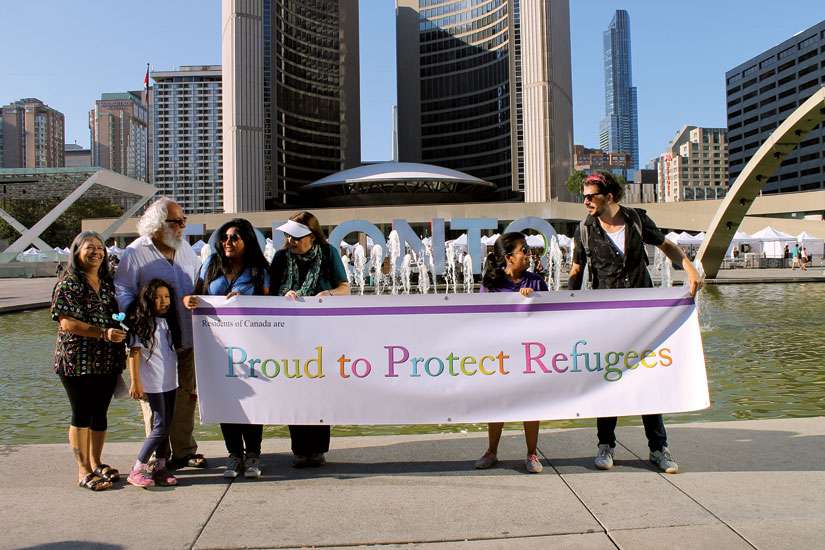“We didn’t have anywhere else to go and one of the social workers at St. Jospeh’s (Hospital) gave my mom the number of Loly Rico,” said Carrillo. “They gave us housing and helped my mom become more stable so that she was able to support me and my brother.”
Along with shelter the trio also found their first friends among those connected with the centre in some way.
“It helped us a lot because when my mom got here she didn’t know anybody and we didn’t have any family or friends so that connection to the centre was really important,” she said. “They helped us out in the beginning until my mom was able to get on her feet. It became like a very close real family there.”
For the past 25 years those new to Canada and in need in Toronto have been able to find a helping hand — indeed family — at the FCJ Refugee Centre.
“We try to have an open space for anybody that comes needing our services as a refugee, as a non-status person or whatever,” said Francisco Rico, the centre’s co-director.
“We help anybody … to obtain a permanent residence status in Canada so they can stay and materialize their dreams. That is the idea behind why we started.”
And it continues to serve as the motivation at the centre which on Sept. 22 formally celebrated its 25th anniversary.
About 300 attended the evening event, most of whom were former clients.
“The whole place was full of people that we have touched in a way,” Rico said. “It was a beautiful celebration.”
In 1991 the centre, co-founded by Rico and his wife Loly one year after coming to Canada from El Salvador, opened its doors. At that time only one part-time employee worked with the couple.
Today the centre employees 10 people full-time who assist between 3,500 to 5,000 clients annually. While the majority come from Latin America, Asia, the Caribbean and Africa, Rico said that over the years they’ve seen clients come from 110 countries. And their reason for fleeing their homelands varies as much as people themselves.
“Some people come from war-torn situations such as the Syrians and people from Iraq or Afghanistan,” he said. “Other people they come due to poverty or due to other types of oppression from different societies like exploitation, lack of democracy — mainly a lack of future for them. Sometimes we also have survivors of human trafficking.”
Rico said those who end up at the FCJ Refugee Centre are “the most vulnerable migrants that come to Toronto.”
And while many things can vary from client to client, there does tend to be one common theme to each of their stories.
“Most of them have the same dream,” he said. “What they want to achieve is a future, to live in a place where they can flourish.”
But there’s more to the centre than a place to help people fill out and file forms necessary for obtaining permanent residency. The centre also provides transitional housing primarily for women who travelled to Canada alone or with children.
“(At first) we only had a space of two bedrooms to receive women and children,” said Rico. “The bedrooms were in the house where my family was living.”
Today the centre operates four houses, which are owned by the Faithful Companions of Jesus, with 24 bedrooms able to accommodate up to 30 people.
And with an increasing number of clients dreaming of a post-secondary education, Rico said there is an effort at the centre to establish an access to education program.
“That is a need that we have identified in the last two years and that will be our focus,” he said. “Our main goal is to create access to education for anybody that has the desire to go to post-secondary education.”
Although that is still being developed Rico said it will continue to do what the centre has always done — fulfil dreams by helping people.
“It’s been a dream come true,” he said, reflecting on the past quarter century. “Every time that we manage to help someone I see how the centre grows. And our centre is going to continue helping more people.”
As for Carrillo, despite being very young at the time, her experience at the centre two decades ago left her wanting to give back, an opportunity she would get in the form of an eight-month placement with the centre while studying at Seneca College.
Since then Carrillo has earned a bachelor’s degree from York University and currently works in Toronto as a social worker serving seniors.


